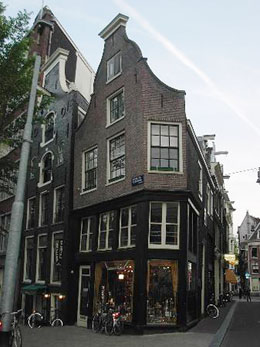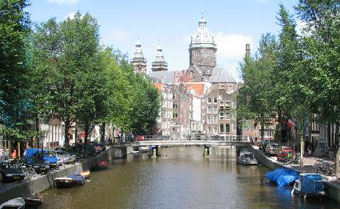|
The Netherlands is located in northwestern Europe and faces the North Sea. It is the largest of the Low Countries, which also include Belgium and Luxembourg. The Netherlands is often called Holland, but Holland is really the name of only the northwestern part of the country.
 |
|
| Rotterdam cubes |
|
The Dutch have a saying that 'God created the world, but the Dutch created Holland'. About half the land in the Netherlands lies at or below sea level. Much of this land has been reclaimed from the sea. The Dutch built dikes around swampy or flooded land and then pumped the water out. The pumping was originally done with windmills, but today electric pumps are used.
The Netherlands has few natural resources, and its lands are poor for agriculture. However, the Dutch people have struggled against these obstacles and have made the Netherlands one of the wealthiest countries in the world. Foreign trade is the mainstay of the Dutch economy. Several major rivers of Europe flow through the Netherlands into the sea. These rivers and the country’s location on the North Sea have helped make it a great trading nation.
With 16.5m people, The Netherlands is one of the most densely populated countries in the world, averaging 489 inhabitants per sq.km. About 90% of its people live in cities. Amsterdam (pop. 750,000) is the capital and largest city. However, the seat of government is in The Hague (pop. 450,000). The country's second largest is Rotterdam (pop. 600,000), the major Dutch port.
| |
 |
| |
Hague parliament |
This small country has made major contributions to art, literature, and science. The 17th century is considered the Golden Age in Dutch history. During this time Dutch artists Rembrandt, Jan Vermeer, and Frans Hals painted masterpieces, and Dutch scientists made startling discoveries with the powerful microscopes and telescopes they built.
The Kingdom of the Netherlands was established in 1815. At first, it included the whole of the Low Countries. Belgium revolted in 1830 and became independent, and Luxembourg became fully separate from the Netherlands in 1890. The Kingdom of the Netherlands today includes, besides the Netherlands proper, the Netherlands Antilles and the island of Aruba.
The Netherlands shares the temperate maritime climate common to much of northern and western Europe. Prevailing winds from the North Sea give the Netherlands mild winters and cool summers. Cloudless days are uncommon, as is prolonged frost. Because the Netherlands has few natural barriers, such as high mountains, the climate varies little from region to region. The average temperature range from -1° to 4°C in January and 13° to 22°C in July. Annual precipitation averages over 700 mm.
The official language of The Netherlands is Dutch, which is spoken throughout the country. In the province of Friesland, however, a large percentage of the population speaks another Germanic language, Frisian, as its first language. Many immigrants still use their native language along with Dutch. The importance of English is growing, especially in education.
Amsterdam (pop. 750,000), is the largest city of the Netherlands. Amsterdam is located in Noord-Holland Province, on the IJ (an arm of the IJsselmeer), near The Hague. It is the commercial, financial, and cultural center of The Netherlands, as well as the country's official capital; however, the real center of national government is in The Hague.
 |
|
| view from the Canal |
|
Amsterdam is a remarkably flat city. Most of the metropolis rests on a foundation of piles driven through peat and sand to a firm substratum of clay. More than 160 canals divide the city into about 90 islands, which are joined by more than 1,000 bridges. The many canals are a famed attraction for visitors, as are the city’s thousands of historic buildings and homes, world-class museums, and tolerant social attitudes.
Located in a central position within the European Union (EU), Amsterdam is one of Europe’s most important commercial centers. A number of international corporations have their European headquarters in the city. Amsterdam’s leading industries include shipbuilding, sugar refining, publishing, brewing, and the manufacture of heavy machinery, paper products, textiles and clothing, porcelain and glass, aircraft, automobiles, and chemicals. The city is also famous as a center for polishing and cutting diamonds.
The service sector employs the great majority of Amsterdam’s workers. It includes business services, such as consulting, telecommunications, and information technology; banking, insurance, and real estate services; trade and transportation services; and cultural, health, education, and social services. Amsterdam is the chief financial center of The Netherlands, and the Dutch branch of the multinational Euronext securities exchange is located in the city. Amsterdam is also home to the headquarters of the Bank of The Netherlands and several large insurance firms. Tourism is important to the local economy.
| |
 |
Amsterdam is The Netherlands’ second largest port, after Rotterdam, and it is linked to the North Sea and to other European countries by a network of railways, highways, and canals. The North Sea Canal, opened in 1876, is navigable by oceangoing vessels. The North Holland Canal, opened in 1824, also reaches the North Sea. The Amsterdam-Rhine Canal, opened in 1952, connects Amsterdam to the Rhine, a major shipping artery of Europe. The Schiphol Airport outside Amsterdam is one of Europe's busiest, and it continues to be expanded.
Electric trams provide public transportation within the city, and a modern commuter train and tram system connects to the greater metropolitan area. Work officially began in 2003 on a subway portion of this system that runs north and south under the city. Bicycles are a widely used form of transportation and private automobiles are restricted in the city center.
Amsterdam began as a medieval fishing village on the mouth of the Amstel River. The settlement got its name in the 1200s after a dam was constructed between dikes to protect farmlands from flooding. The first written record of the name (originally spelled Amstelredam) is from 1275. Amsterdam was chartered as a city about the year 1300, and it became a member of the Hanseatic League (a German trading association) in 1369.
Amsterdam rose to prominence in Europe in the late 16th century after Spanish forces sacked Antwerp, then the leading commercial center of northern Europe. Protestant merchants in Antwerp fled to Amsterdam, which soon absorbed much of Antwerp’s trade. Other European refugees were also drawn to Amsterdam’s tradition of social and religious tolerance. They included Jews from Portugal and Germany, and later, French Huguenots, all of whom brought important skills to the city. In the 17th century, after the successful conclusion of the Dutch wars for independence from Spain, Amsterdam became the chief commercial and financial center for northern Europe. The city profited enormously from colonial trade generated by the Dutch East India Company and the Dutch West India Company, both founded with help from Amsterdam.
 |
|
The city held its dominant commercial position until the late 18th century, when trade declined as a result of the silting of the Zuider Zee and the British blockade before and during the Napoleonic Wars (1799-1815). In 1810 Napoleon incorporated The Netherlands into the French Empire. After his downfall The Netherlands regained its independence and the seat of government was moved from Amsterdam to The Hague. In the latter part of the 19th century, commercial activities revived with the opening of the North Sea and Merwede canals.
In 1928 the city hosted the Summer Olympic Games. A few years later the worldwide depression of the 1930s slowed global commerce and brought much economic difficulty to the city. In recent decades, Amsterdam has undertaken major urban renewal efforts to replace or rebuild some older parts of the city. Lack of affordable housing remains a serious problem, however, and it has led to confrontations with well-organized squatters, who take over unoccupied buildings to live rent-free or to prevent demolitions.
Amsterdam entered the 21st century with innovative plans for using technology to bring economic, social, and educational benefits. City-sponsored projects included providing free computers to school-aged children in low-income households and the construction of a universal public fiber-optic network to meet demands for high-speed Internet and other data services.
| • Venue - Hotel Accommodation |
The 7th European Champions' Cup will be hosted at the Het Witte Huis ('The White House'), located next to the Olympic Stadium.
For accommodation, the following hotels are recommended: |
|
Het Witte Huis
IJsbaanpad 45
NL-1076 CV Amsterdam
The Netherlands |
|
| |
| Contact details |
Distance
from venue |
Double
room |
Single
room |
Information |
|
| • Apollofirst Hotel |
|
Mrs Caroline Venmans
Apollolaan 123-127
1077 AP, Amsterdam |
3 km |
€135
(incl. breakfast) |
€125
(incl. breakfast) |
A Hampshire classic hotel.
Reservation code: Bridge Champions' Cup |
| • RobertRamon Hotel |
|
Mr Mark Stein
PC Hooftstraat 24-28
1071 BX, Amsterdam |
5 km |
€139
(incl. breakfast) |
€105
(incl. breakfast) |
Reservation code: Bridge Champions' Cup |
| • Bilderberg Hotel Jan Luyken |
|
Naftalie Braakman
Jan Luykenstraat 58
1071 CS, Amsterdam |
4 km |
€174
(incl. breakfast & 5% taxes) |
€174
(incl. breakfast & 5% taxes) |
Reservation code: Bridge Champions' Cup |
| • Bilderberg Garden Hotel |
|
Naftalie Braakman
Dijsselhofplantsoen 7
1077 BJ, Amsterdam |
3 km |
|
|
Reservation code: Bridge Champions' Cup |
Please note that taxis in Amsterdam are quite expensive.
For hospitality and information details, please contact:
|
|
Ed Franken
 31-0-23-528 0278 31-0-23-528 0278
 edfranken@xs4all.nl edfranken@xs4all.nl
|
|
|

